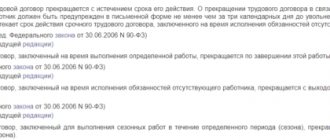What are the limitations of using a fixed-term employment contract?
It is impossible to conclude a “temporary” (or, in legal language, fixed-term) employment contract with an employee, guided only by the desire of the employer.
The list of cases in which the legislator allows a fixed-term employment contract to be drawn up is given in the article of the Labor Code of the Russian Federation. This list is exhaustive. At the same time, the article of the Labor Code of the Russian Federation states that if a fixed-term employment contract is concluded, then its text must indicate the circumstances (reasons) that served as the basis for the application of such a contract. Maintain personnel records and calculate salaries in the web service
Thus, it is possible to formalize a temporary employment relationship with an employee only in cases where this is directly permitted by the provisions of an article of the Labor Code of the Russian Federation. To be fair, we note that the list of situations given in this article is quite long. Moreover, some items on the list are open-ended, which makes it possible to further expand the scope of a fixed-term employment contract.
The list itself is divided into two parts. The first includes cases when a fixed-term employment contract can be concluded at the initiative of the employer. And the second part of the list lists situations where the application of a fixed-term employment contract requires agreement of the parties. Concluding the description of the general rules that govern the conclusion of fixed-term employment contracts, let us once again draw your attention to an extremely important rule. Even if the employee does not object to the temporary nature of the employment relationship, a condition regarding the duration of its validity can be included in the employment contract only if this is directly permitted by the provisions of the article of the Labor Code of the Russian Federation.
Below we will dwell in more detail on the most common grounds from the first part of this list (that is, we will consider cases when a fixed-term employment contract can be concluded at the initiative of the employer).
Legislative regulation
Particular attention should be paid to the duration of the agreement. Article 58 of the Labor Code of the Russian Federation establishes two types of contracts depending on their urgency.
- Urgent . This type of agreement is concluded for a certain period, which is agreed upon between the employer and employee. The end date of work activity must be indicated in such a document. The maximum period of the agreement cannot exceed 5 years in calendar terms.
- Indefinite . This type of agreement is concluded for an indefinite period. In essence, the employee in this case is accepted without any conditions.
As a rule, the text of the document itself indicates that it is concluded for an indefinite period. Moreover, if the time is not specified, this also means that the agreement was concluded without restrictions on the period of validity.
Temporarily absent employee
Perhaps, in practice, the most common situation in which it is possible to conclude an employment contract for a certain period is hiring to perform the duties of a temporarily absent employee. In this case, the job remains with the “main” employee. But while he is not doing his job, you can temporarily take another person in his place (Part 1 of Article of the Labor Code of the Russian Federation, letter of Rostrud dated November 3, 2010 No. 3266-6-1).
Features of concluding a fixed-term contract
The Labor Code does not specify the reasons why the “main” employee may be absent from the workplace. Therefore, there can be absolutely any reasons. For example, temporary disability, leave (not only to care for a child, but also annual paid or unpaid leave), temporary transfer based on a medical certificate to another job, the employee’s performance of state or public duties, undergoing a medical examination or advanced training outside of work. work.
Moreover, it is possible to hire a “temporary deputy” even if the reason for the absence of the “main” employee has not been established. Indeed, in such a situation, the employer has no grounds for dismissing the “main” employee for absenteeism, since the reason for his absence from work may turn out to be valid (for more details, see the article “What to do if an employee disappears”).
According to the article of the Labor Code of the Russian Federation, a fixed-term employment contract is concluded for the duration of the duties of an absent employee. In other words, a “temporary” employee will perform labor functions for a specific position or for a specific job. However, as a general rule, a fixed-term employment contract can be concluded for a period of no more than five years. This is directly established in paragraph 2 of part 1 of article of the Labor Code of the Russian Federation.
Let us note one more important point: it is impossible to draw up a fixed-term employment contract under which a “temporary” employee will alternately replace several absent “core” employees (for example, during their vacations). This is due to the fact that an article of the Labor Code of the Russian Federation provides for the execution of a fixed-term employment contract for the duration of the duties of an absent employee, that is, we are talking about a specific employee and the performance of his labor functions. Therefore, if it is necessary to organize “safety net” during the holidays of the “main” employees, then each time you will have to draw up a new contract (i.e., terminate the fixed-term employment contract when the “main” employee leaves and enter into a new one during the absence of another employee).
What to write in the contract and in form No. T-1
As noted above, on the basis of an article of the Labor Code of the Russian Federation, in a fixed-term employment contract it is necessary to directly indicate that the contract is concluded for a temporary period, and provide the corresponding reason from the list established by the article of the Labor Code of the Russian Federation. In the case under consideration (when hiring for the duration of the duties of an absent employee), it is recommended to include the following wording in the contract:
“In accordance with Part 1 of Art. According to the Labor Code of the Russian Federation, this employment contract is fixed-term and was concluded for the duration of the duties of accountant Olga Borisovna Nikonova in connection with her being on maternity leave until she reaches the age of one and a half years.”
Draw up and print an employment contract for free
If the reason for the absence of the “key” employee is not established, then the wording is shortened:
“In accordance with Part 1 of Art. of the Labor Code of the Russian Federation, this employment contract is fixed-term and was concluded for the duration of the duties of the absent accountant Olga Borisovna Nikonova.”
The same wording must be repeated in the line “Conditions of employment, nature of work” of the employment order (Form No. T-1).
Fill out and print out an order using form No. T‑1 for free
And in the section (clause) of the employment contract dedicated to the duration of its validity, indicate: “until the accountant Olga Borisovna Nikonova goes to work.” A similar entry is made in the “by” column of the employment order.
Temporary work
The next situation with which the article of the Labor Code of the Russian Federation connects the possibility of concluding a fixed-term employment contract is the performance of temporary (for a period of up to two months) work.
Features of concluding a fixed-term contract
A specific list of temporary work is not established in the legislation. The above means that it is possible to conclude a fixed-term employment contract on this basis to perform virtually any work, if it is carried out within no more than two months. This work can be either for a specific position or specialty (for example, you can enter into a fixed-term employment contract with a driver for the transportation of goods by car; the specialty “driver” will be indicated in the contract), or not tied to such (for example, the contract will only indicate type of work “territory cleaning”).
It is important to note that, as a general rule, for persons with whom an employment contract has been concluded for a period of up to two months, a probationary period is not established (Article of the Labor Code of the Russian Federation).
What to write in the contract and in form No. T-1
According to Part 2 of Article of the Labor Code of the Russian Federation, in employment contracts with employees who are hired for temporary work, it is possible to indicate not the position, but the specific type of work assigned. For example, it could be worded like this:
“cleaning the premises of workshop No. 3 from large-sized debris, cleaning surfaces, including washing them with a high-pressure apparatus, loading garbage into containers.”
This wording will need to be repeated in the employment order (form No. T-1) in the column “Position (specialty, profession).”
In addition, the employment contract must reflect the period or event that will determine the end of the work. The requirement of the article of the Labor Code of the Russian Federation on indicating the reason for concluding a temporary contract must also be met. Thus, the following formulation can be recommended:
“In accordance with Part 1 of Art. According to the Labor Code of the Russian Federation, this employment contract is fixed-term and was concluded for the duration of the cleaning work in workshop No. 3.”
In the employment order, in the section “Conditions of employment, nature of work” you should write: “for the duration of temporary work.” And in the “by” column of this order, you must indicate either the completion date of the work, or (if this date is not known in advance) the event that will determine the completion of the work (for example, “completion of cleaning work in workshop No. 3”). In the second case, it is necessary to ensure that the period of work does not exceed the two months permitted by the article of the Labor Code of the Russian Federation. Otherwise, there is a high risk of recognizing the employment contract as indefinite.
Seasonal work
Seasonal work is another case permissible under the article of the Labor Code of the Russian Federation for drawing up a fixed-term employment contract. In fact, seasonal work is very close to the temporary work discussed above. The only difference is that the legislation contains more specifics on the issue of classifying certain jobs as seasonal.
Features of concluding a fixed-term contract
The article of the Labor Code of the Russian Federation provides the following definition of seasonal work: work that, due to natural conditions, can only be performed during a certain period (season). At the same time, the Labor Code does not limit the duration of the season, saying only that, as a rule, it does not exceed six months (Article 293 of the Labor Code of the Russian Federation).
The list of seasonal work, as well as their maximum duration, are established by industry agreements (Part 2 of Article 293 of the Labor Code of the Russian Federation). Also for these purposes, you can be guided by the List of Seasonal Works (approved by Decree of the People's Commissariat of Labor of the USSR dated October 11, 1932 No. 185) and other documents (for example, Decrees of the Government of the Russian Federation dated 04/06/99 No. 382 and dated 07/04/02 No. 498, Resolution of the Council of Ministers of the RSFSR dated 04.07.91 No. 381).
As we can see, in order to conclude a fixed-term employment contract on this basis, it is necessary that the seasonal nature of the work be officially confirmed. That is, the relevant type of work must be included in an industry agreement or regulation. Moreover, the term of such an agreement cannot exceed the term of the season established by the same document.
However, a probationary period for those hired for a period of up to two months is not assigned. If the employment contract is concluded for a period of two to six months, then the probationary period can be up to two weeks (Article of the Labor Code of the Russian Federation).
What to write in the contract and in form No. T-1
It should be noted in the employment contract that it is concluded for a season. Since the length of the season depends on natural and climatic conditions, it is not necessary to indicate a specific end date of the employment contract (Part 4 of Article of the Labor Code of the Russian Federation). Accordingly, the wording of the employment contract may be as follows:
“In accordance with Part 1 of Art. Of the Labor Code of the Russian Federation, this employment contract is fixed-term and was concluded to perform seasonal work on clearing and removing snow and ice (subparagraph “b”, paragraph 5 of the List of Seasonal Work, approved by Resolution of the People’s Commissariat of the USSR dated October 11, 1932 No. 185).”
The same wording must be transferred to the employment order (Form No. T-1). Moreover, in the “by” column of this order, the expiration date of the employment contract can be indicated not only by the specific end date of the season, but also by the occurrence of an event (for example, write “end of the season”).
Normative base
Types of contracts are described in Article 58 of the Labor Code of the Russian Federation. The grounds for drawing up a temporary contract are specified in Article 59 of the Labor Code of the Russian Federation.
The end of the temporary contract is regulated by paragraph 2 of Article 77 of the Labor Code of the Russian Federation.
The exclusion of a probationary period for employees hired under a fixed-term contract is stipulated in Article 289 of the Labor Code of the Russian Federation.
The duration of seasonal work for which a fixed-term contract is concluded is described in Article 293 of the Labor Code of the Russian Federation, and the list of these works, the accrual of length of service and the procedure for this process are listed in Decree of the Government of the Russian Federation of July 4, 2002 N 498.
Work outside the normal course of business of the employer
The next legal basis for concluding a fixed-term employment contract is the performance of work beyond the normal activities of the organization.
Features of concluding a fixed-term contract
Directly in the article of the Labor Code of the Russian Federation, only an approximate list of such works is given. This includes reconstruction, installation, commissioning and other similar work. When using such a basis for concluding a fixed-term employment contract, it is important that the type of work really goes beyond the normal activities of the organization. In other words, it must be some kind of irregular work that is unusual for the company. That is why reconstruction, installation and commissioning work are given as examples of such work, that is, those works that are performed from time to time and not constantly.
On this basis, a fixed-term employment contract can be drawn up for a period not exceeding five years (clause 2, part 1, article of the Labor Code of the Russian Federation). The one-year limit established in paragraph 6 of part 1 of article of the Labor Code of the Russian Federation applies to employment contracts that are concluded in connection with a temporary expansion of production or the volume of services.
What to write in the contract and in form No. T-1
The employment contract reflects the temporary nature of the work, the date of its end or the event with which the end of the work is associated, as well as the content of the work or the employee’s labor function. Accordingly, the following formulation can be used:
“In accordance with Part 1 of Art. of the Labor Code of the Russian Federation, this employment contract is a fixed-term one and was concluded to perform obviously temporary work on the reconstruction of the premises of workshop No. 3, beyond the scope of the employer’s normal activities.”
In the order for employment (form No. T-1), the nature of the work is indicated: “to carry out work on the reconstruction of the premises of workshop No. 3.” In the “by” column of this order, the date of termination of the employment relationship is indicated or the event with which the completion of the work is associated is displayed (for example, “before the completion of the reconstruction of the premises of workshop No. 3”).
What is the difference between a fixed-term and an open-ended contract?
For ease of comparison, we present the data in the form of a table:
| Index | Perpetual TD | Urgent TD |
| Validity | Has no expiration date | Maximum five years. The deadline can be indicated by a date or event (the departure of a permanent employee, the end of temporary work). In addition, the validity period of the contract is indicated in the order |
| Reason for imprisonment | Not specified | Must be specified in the order |
| Worker task | The employer constantly assigns new tasks | The task is one-time and specific |
Deliberately temporary expansion of production
Temporary expansion of production or the volume of services provided is named by the legislator as the basis for concluding a fixed-term employment contract in the same paragraph of the article of the Labor Code of the Russian Federation as the performance of work that goes beyond the normal activities of the company. However, for the case of a temporary expansion of production (or the volume of services provided), additional restrictions have been established, which allows us to speak about the independence of this basis.
Features of concluding a fixed-term contract
When using this basis, it is important that the employer is aware in advance of the temporary nature of the expansion of production (see the rulings of the Supreme Court of the Republic of Karelia dated 08.19.14 No. 33-3257/2014 and the Moscow City Court dated 01.20.14 No. 33-1433/2014). For example, a deliberately temporary expansion of production may be associated with the conclusion of a contract for the supply or performance of work. Due to the direct indication of the article of the Labor Code of the Russian Federation, a temporary employment contract on this basis can be concluded for a period of no more than one year.
Similar conditions apply in the case of concluding a fixed-term employment contract on the basis of a temporary expansion of the scope of services provided: the employer must be aware in advance of such an expansion of the scope of services and the term of such a contract cannot exceed one year.
What to write in the contract and in form No. T-1
Since the expansion of production or the volume of services provided must be obviously temporary, we recommend indicating this directly in the employment contract. For example, you could use the following wording:
“In accordance with Part 1 of Art. Labor Code of the Russian Federation, this employment contract is fixed-term and was concluded in connection with a temporary expansion of the scope of services provided by the employer for changing carpets in the administration building of the city of Kolomna (state contract dated August 20, 2021) for a period until March 15, 2021.”
In this case, in the employment order (Form No. T-1) in the section “Conditions of employment, nature of work” it is indicated: “in connection with the temporary expansion of the volume of services provided for changing carpets.”
When an employment contract can be concluded for an indefinite period
An open-ended agreement between an employer and an employee is drawn up in the case of permanent employment on a long-term basis. It is concluded within three days (Article 67 of the Labor Code).
The circumstances for BS are:
- availability of a vacancy in the company;
- the employee’s ability to fulfill the organization’s requirements in full;
- the employer's desire to accept a citizen.
The package of documents for registration is prepared in the same way as when concluding a fixed-term contract.
If additional benefits are available, the employee must provide supporting documents:
- birth certificates of children - for large families;
- MSEC certificate - for people with disabilities;
- documents about existing dependents.
If the legality of the relationship is violated, a fine is imposed on the enterprise. Incorrect drafting of a contract for a citizen entails a reduction in social rights.
Doing a specific job
Based on an article of the Labor Code of the Russian Federation, a fixed-term employment contract can be concluded with persons who are hired to perform a clearly defined job in cases where its completion cannot be determined by a specific date. Such an agreement is terminated after completion of this work (clause 14 of the resolution of the Plenum of the Supreme Court of the Russian Federation dated March 17, 2004 No. 2 “On the application by the courts of the Russian Federation of the Labor Code of the Russian Federation”).
Features of concluding a fixed-term contract
In practice, this basis is often used by employers who need to attract various specialists to fulfill various contracts (including state and municipal ones). However, it must be taken into account that judicial practice proceeds from the fact that, on this basis, it is permissible to conclude an employment contract for the duration of the state contract only if the subject of the contract goes beyond the normal activities of the employer (see, for example, the appeal ruling of the Moscow City Court dated 01/20/14 in case No. 33-1433). If the state contract is related to the main activity of the employer, the courts side with the employees and find no grounds for concluding a fixed-term employment contract (see, for example, the appeal ruling of the Rostov Regional Court dated 08.08.13 in case No. 33-9919/2013).
It must be remembered that the basis in question can be used for concluding a fixed-term employment contract only if the deadline for completing the work cannot be established in advance. This must also be taken into account when deciding on hiring employees (including for performing work under government contracts concluded by the company).
What to write in the contract and in form No. T-1
As mentioned above, the use of this basis is possible only if the completion date of the work cannot be determined by a specific date. Consequently, in the employment contract and in the order for employment (Form No. T-1), an event will always be indicated as the completion date of the work.
The employment contract must note its urgent nature and reflect the specific type of assigned work for which the employee is hired. For example, it could be worded like this:
“In accordance with Part 1 of Art. Labor Code of the Russian Federation, this employment contract is fixed-term and was concluded due to the fact that the completion date of repair work in the premises of workshop No. 3 cannot be determined by a specific date. The employee is hired for the position of category 3 painter.”
In the employment order, in the column “Conditions of employment, nature of work,” you can enter, for example, the following phrase: “to carry out painting work on external and internal surfaces (ceiling, walls, floor) of workshop No. 3.” And in the “by” column of this order, you should indicate: “until the signing of the act of acceptance of painting work.”
Employment contract at Russian Railways
If we talk about how long an employment contract can be concluded in Russian Railways, then you need to understand that labor relations in Russian Railways are regulated by the provisions of the current labor legislation. Accordingly, the conclusion of employment contracts with both management and ordinary employees of this organization is carried out in accordance with the provisions of Art. 58 taking into account the specifics of the direct work activity of a particular employee.
How to fill out a work book
In conclusion, we note that the urgent nature of the employment relationship (for any of the reasons listed above) does not in any way affect the procedure for filling out the employee’s work book. Thus, it should not indicate that the contract was concluded for a certain period. After all, this is not provided for either by the Labor Code, or by the Instructions for filling out work books (approved by Resolution of the Ministry of Labor of Russia dated 10.10.03 No. 69), or by the Rules for maintaining and storing work books, producing work book forms and providing them to employers (approved by Resolution of the Government of the Russian Federation dated April 16, 2003 No. 225).
If the employer enters into the work book information about the period for which the employment contract is drawn up, then this will be a violation of the procedure for maintaining work books, and may entail administrative liability under Article 5.27 of the Code of Administrative Offenses of the Russian Federation.








